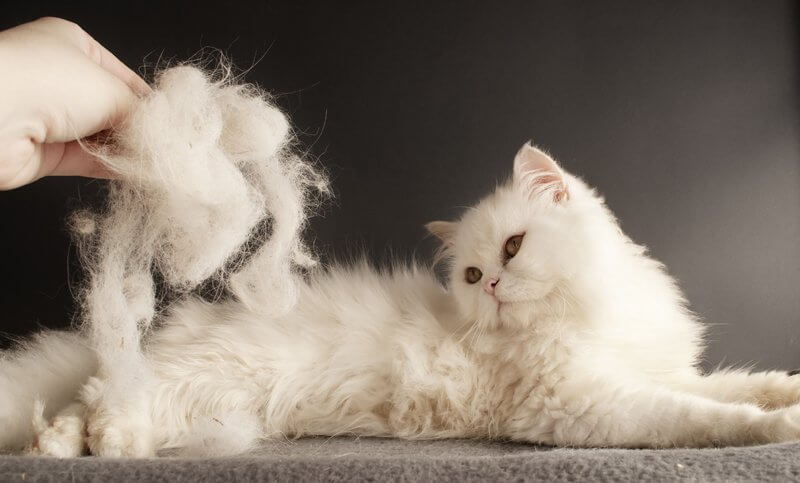Do you suddenly find more cat hair than usual in the apartment? Or discover bald spots in the cat’s fur? Find out here what causes hair loss in cats.
Cat Has Hair Loss and Bald Spots: Causes

Whether through licking as in self-induced alopecia, hair growth disorders, or hair breakage: Hair loss (alopecia) can have many different causes.
Hair loss from parasites
We have already mentioned fleas – itchy flea bites can lead to hair loss because the cat licks more. An infestation with mites also thins the cat’s fur and can make the cat bald.
Hair loss from infections
Infection can cause the cat to get bald spots. Infections can be triggered by:
- Fungal skin of the cat
- Bacterial infections
- Viral infections
In these cases, one symptom rarely comes alone. Bacterial infections can be accompanied by tiredness and fever.
Hair loss in cats due to malnutrition
Hair loss due to malnutrition is almost never seen in homemade velvet paws. Even in neglected cats or strays, hair loss is mostly caused by parasites or inflammation. However, if the four-legged friend is poorly nourished and has a weak constitution, this promotes alopecia. Sick, elderly cats, as well as pregnant and nursing cats, have an increased need for nutrients.
Hair loss due to diseases
In rare cases, internal diseases are behind hair loss in cats. These can be hormone-related diseases such as thyroid disorders. The disease often leads to flaky, dry skin, which in turn causes itching – cats lick themselves more often. Pain, for example from a tumor under the skin, can also lead to increased licking and thus to hair loss.
Why Is My Cat Licking Its Bald Head?
“Feline self-induced alopecia” simply means: the cat licks its bald head. “Alopecia” stands for “hair loss”. What surprises many keepers: Licking is the leading cause of cat alopecia.
Because they do not notice that their cats are licking their heads. In particular, people who walk outdoors often only see the result, the bald spots. But why is the cat licking its hair bald? There can be various reasons for this:
- Itching, for example from allergies or fleas;
- Pain from diseases such as tumors;
- Stress that the velvet paw would like to compensate through intensive cleaning (psychogenic leak alopecia).
The best way to find out the correct cause is with a veterinarian.
Hair Loss in Cats Due to Coat Change
The simplest cause of your cat suddenly losing more hair is when it changes its coat twice a year. For a few weeks in spring and autumn, the coat on the velvet paw thins. In these weeks you will find more hair on the sofa or in the cat basket.
“Hair loss” due to a change of coat is completely natural and your cat does not get bald spots. The fur becomes thinner in spring and thicker in winter. You can support the change of coat with regular brushing.
Pleasant side effects: Your cat swallows less hair while cleaning and you will find fewer “fur mice” in your apartment.
Hair Loss in Cats – When to Go to the Vet?
Anyone discovering bald spots on the cat’s body should take the cat to the vet. He can determine the exact cause and give recommendations for treatment. In addition to a thorough medical history, a blood test or a painless skin swab may be necessary for the diagnosis.
The veterinarian can use a microscope Trichogramma to determine whether the hair has been “licked”: Then the fur is still in the growth phase and has been shortened in the appropriate places, not fallen out.
It is important that therapy for alopecia begins promptly. Because many cats with bald patches of skin suffer. You experience pain, stress, or severe itching.
Remedies for Hair Loss in Cats
Whether parasitic or fungal infestation: the vet will draw up a therapy plan that is individually tailored to your cat. For example, depending on the cause of the alopecia:
- An elimination diet;
- Parasite Control;
- Antibiotics for bacterial infections;
- Antifungal drugs against fungal attack;
- Various other drugs, such as cortisone.
Sometimes a combination of different therapies is necessary to stop hair loss. If the cat licks its bald head because it is stressed, patience and a lot of empathy can be required.
What to Do if the Cat is Pecking Itself Due to Stress?
The good news first, studies show that only 1 in 10 cats who experience hair loss from licking will have psychogenic alopecia. However, if allergies, skin diseases, or pain from other diseases are excluded, this could be the case for your cat.
Psychogenic alopecia can be triggered by drastic changes. These include the death or departure of a four-legged friend, moving house, or new family members such as a baby or another cat. Think about what may be causing internal stress for your cat.
If necessary, create retreats for stressed velvet paws or lovingly accompany the grief phase after a loss. A veterinarian who specializes in behavioral therapy is the best point of contact. Sometimes going to the animal psychologist can also be helpful. In addition, the following funds can support:
- Pheromone sprays
- Dietary supplement with L-theanine
- Medicines from the vet

